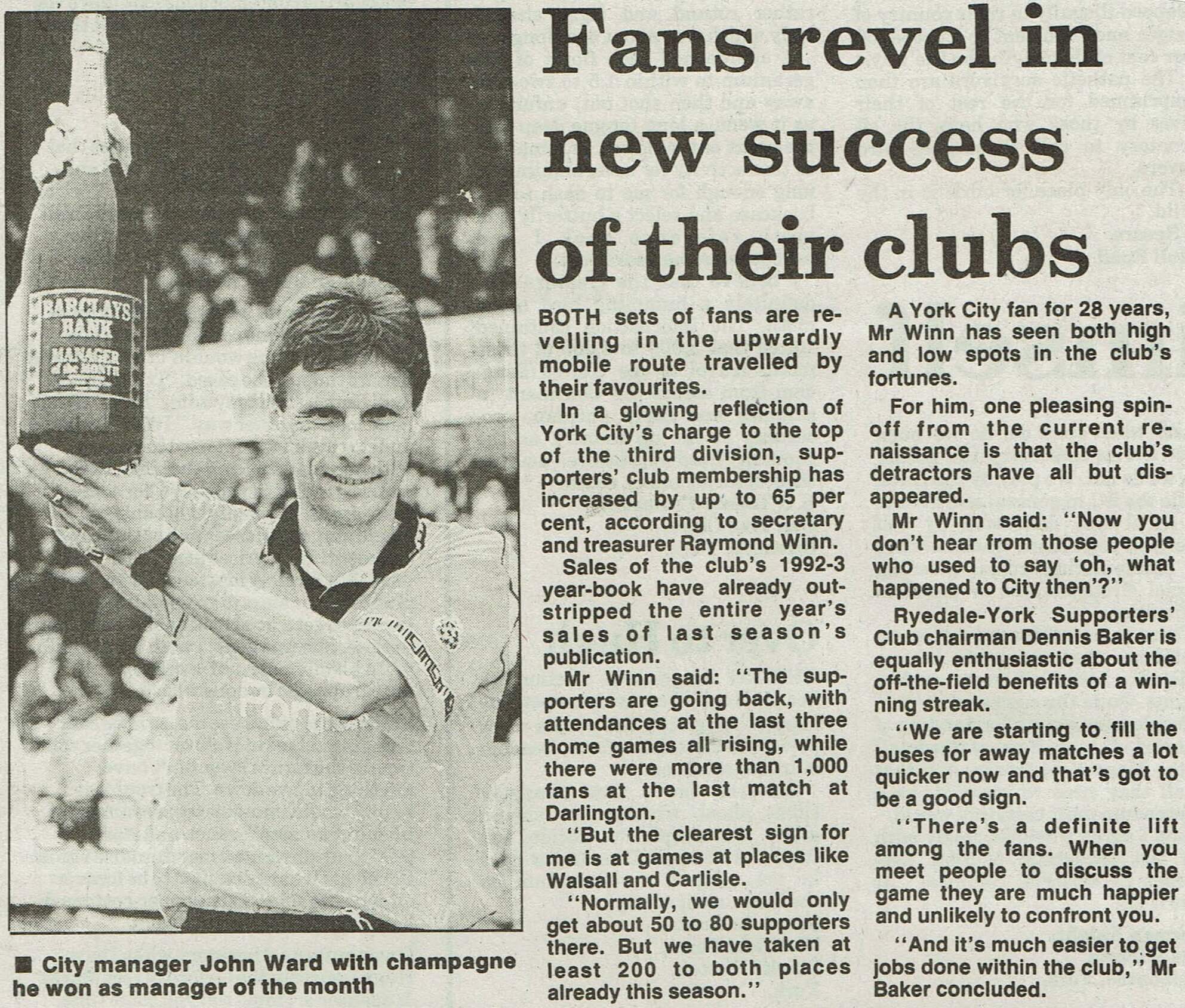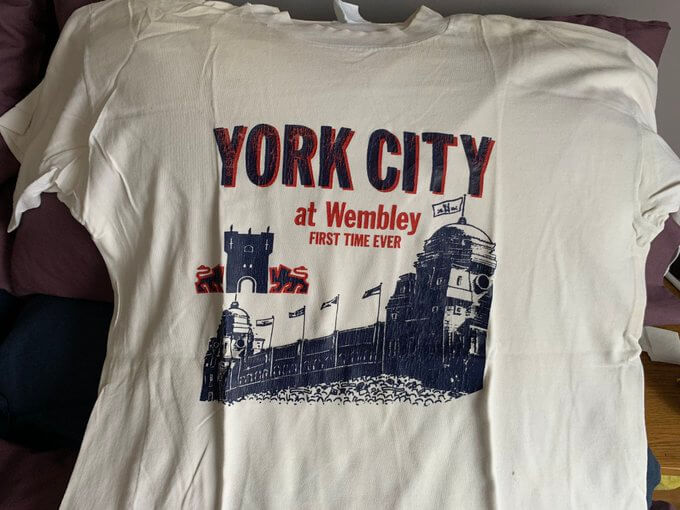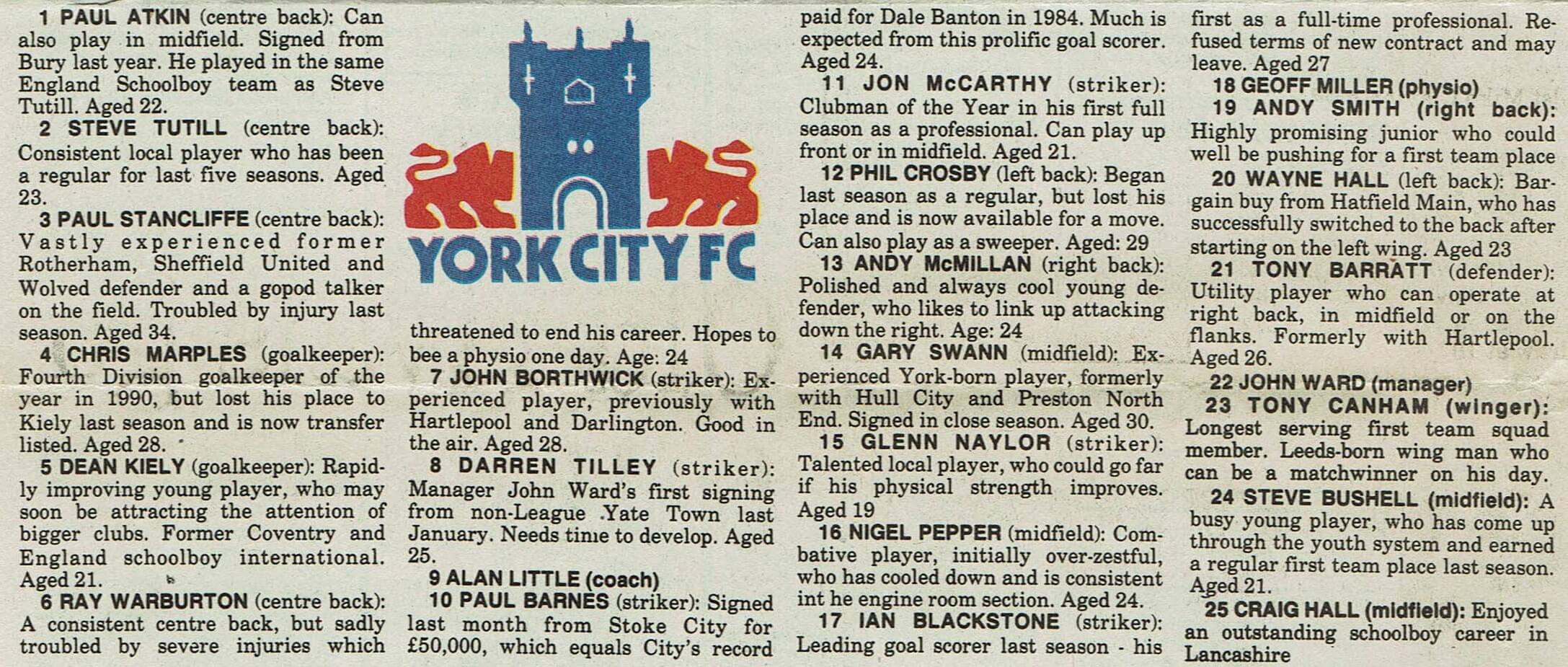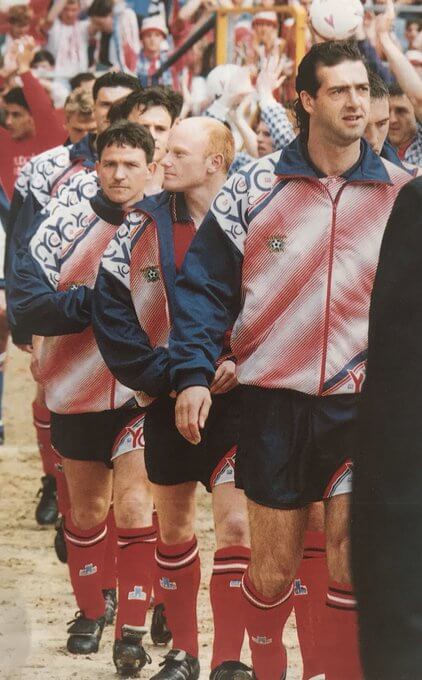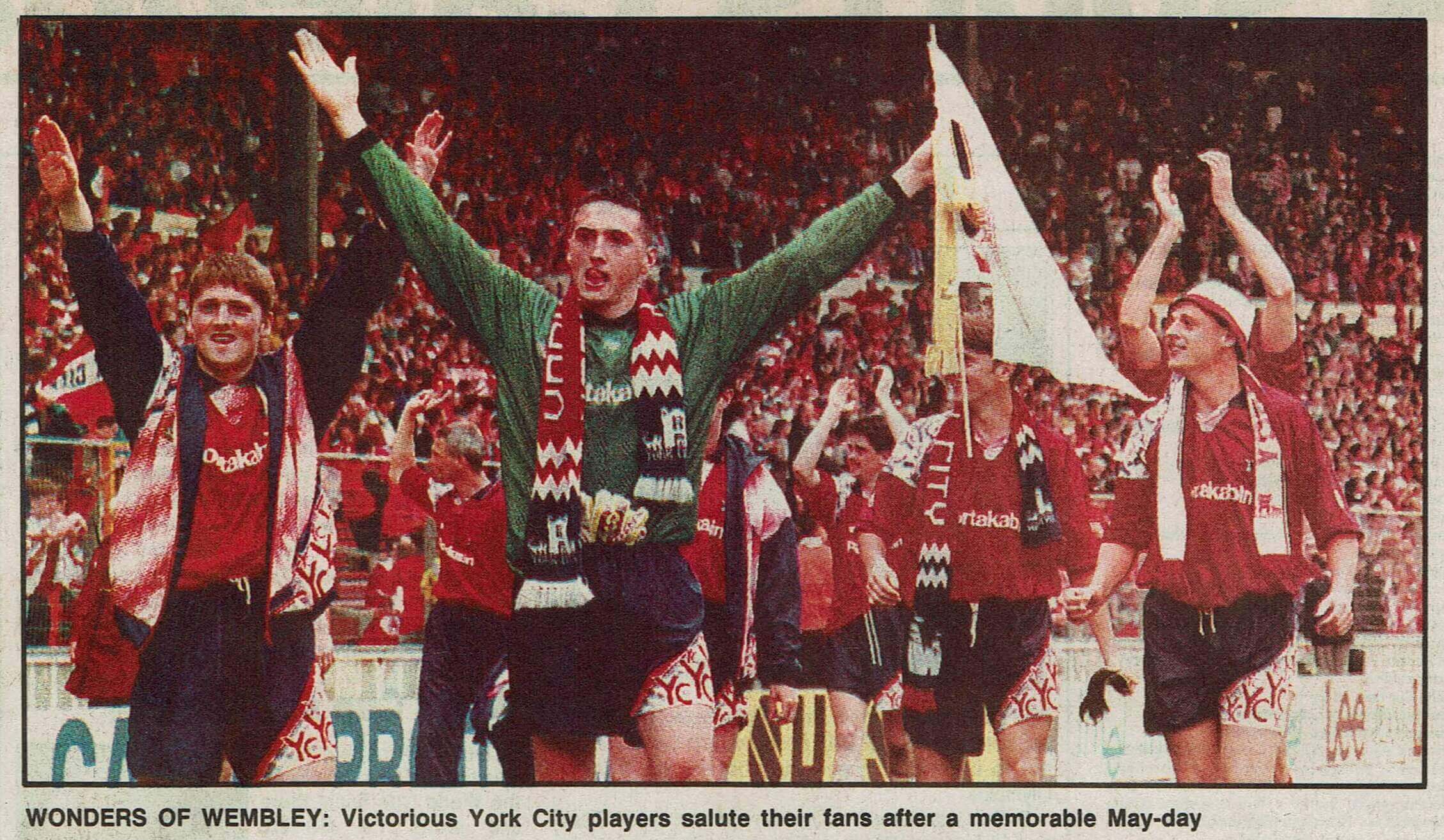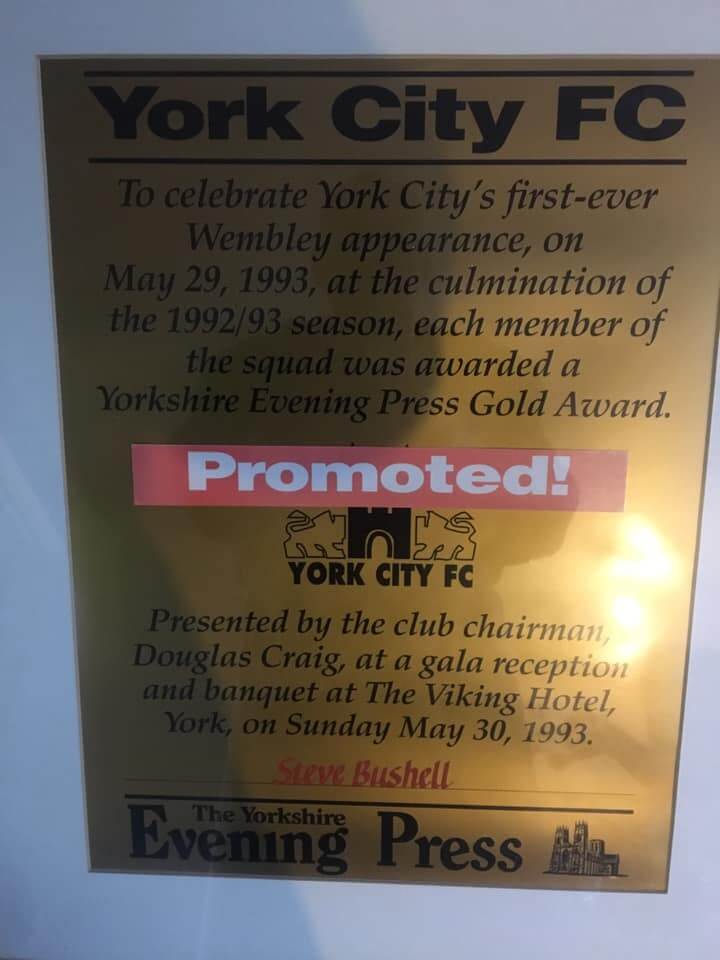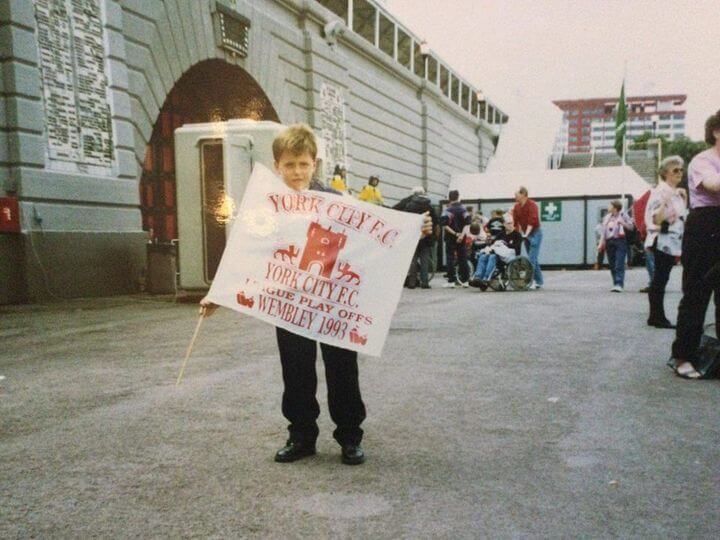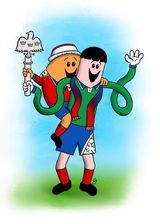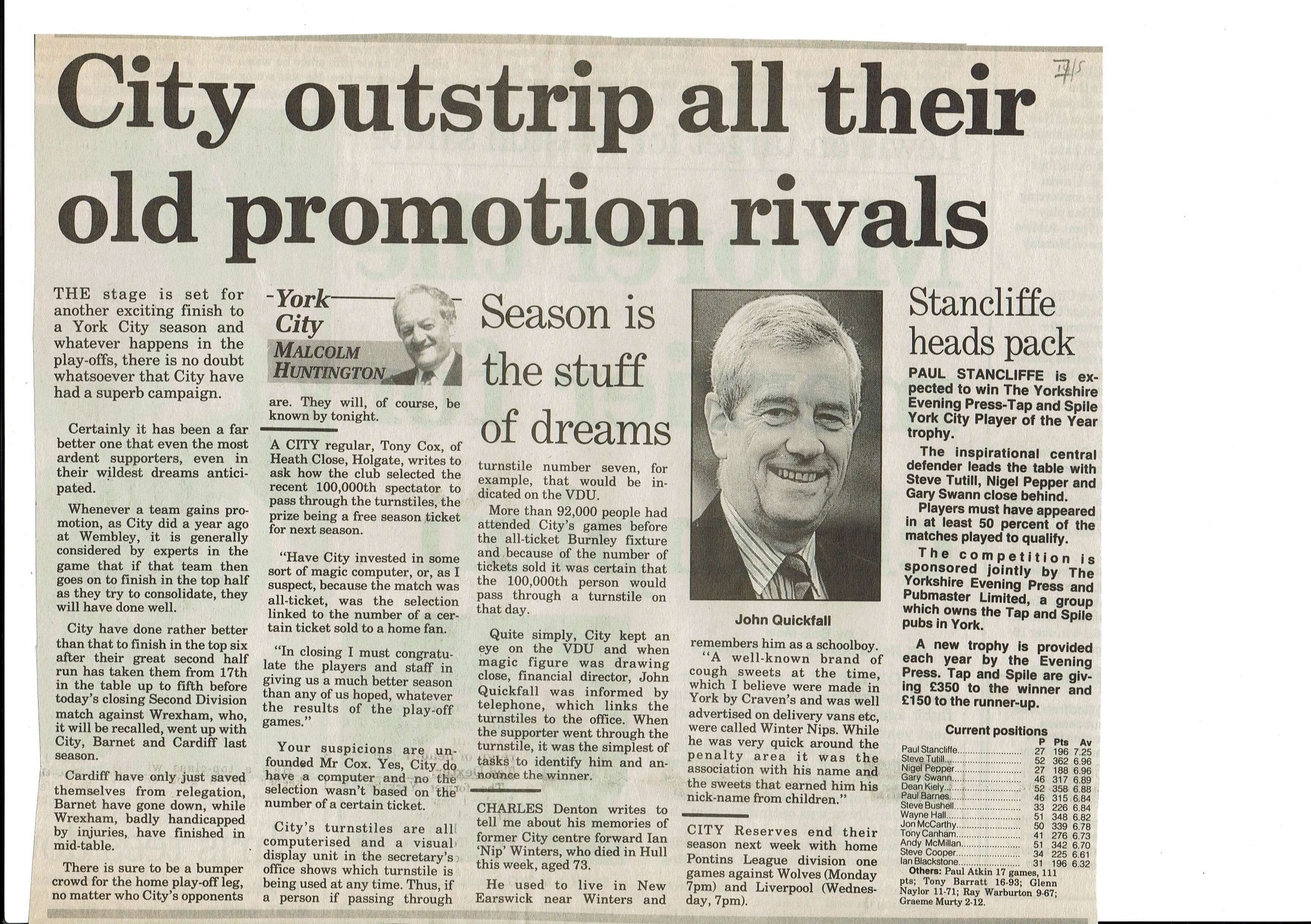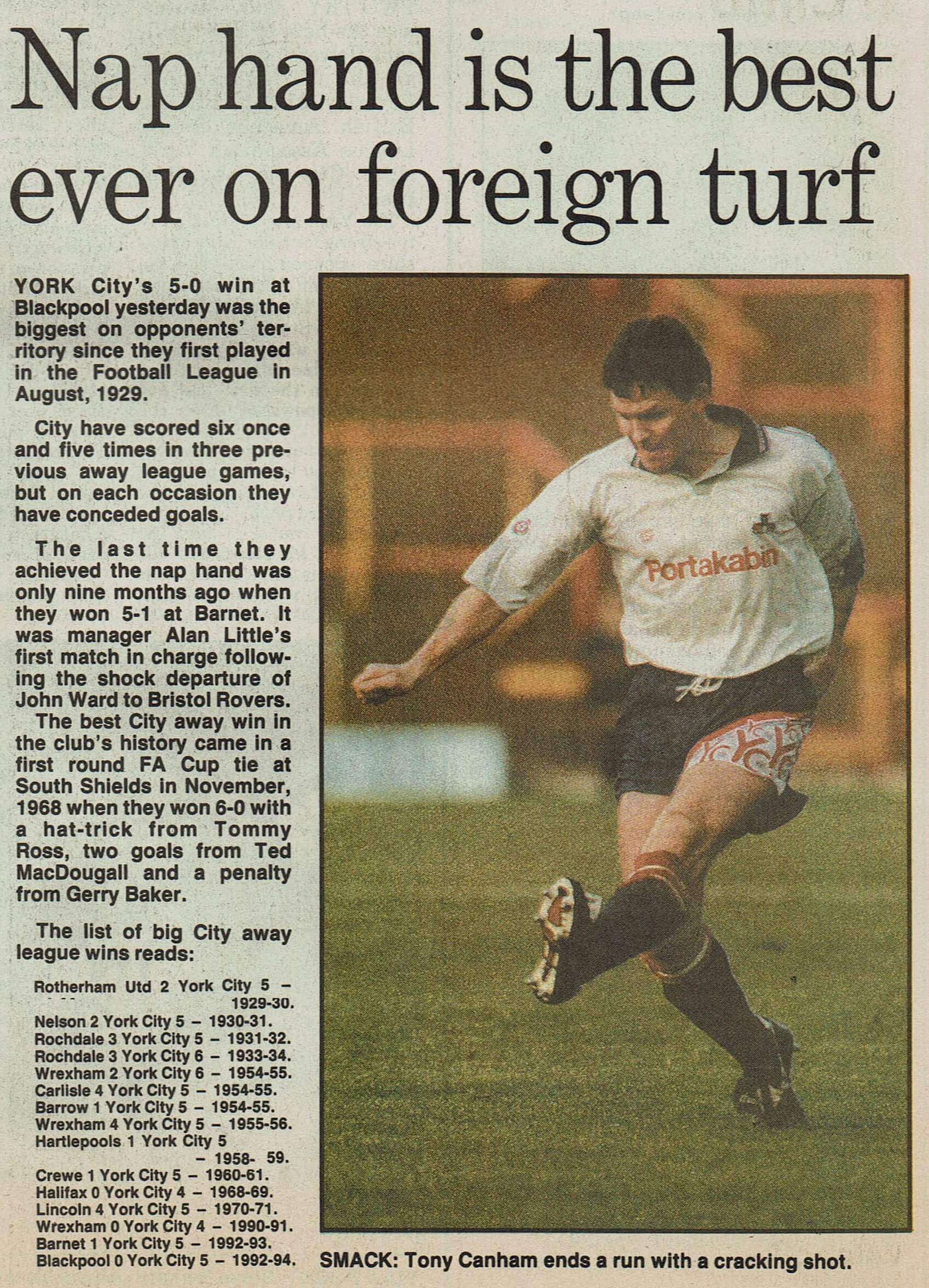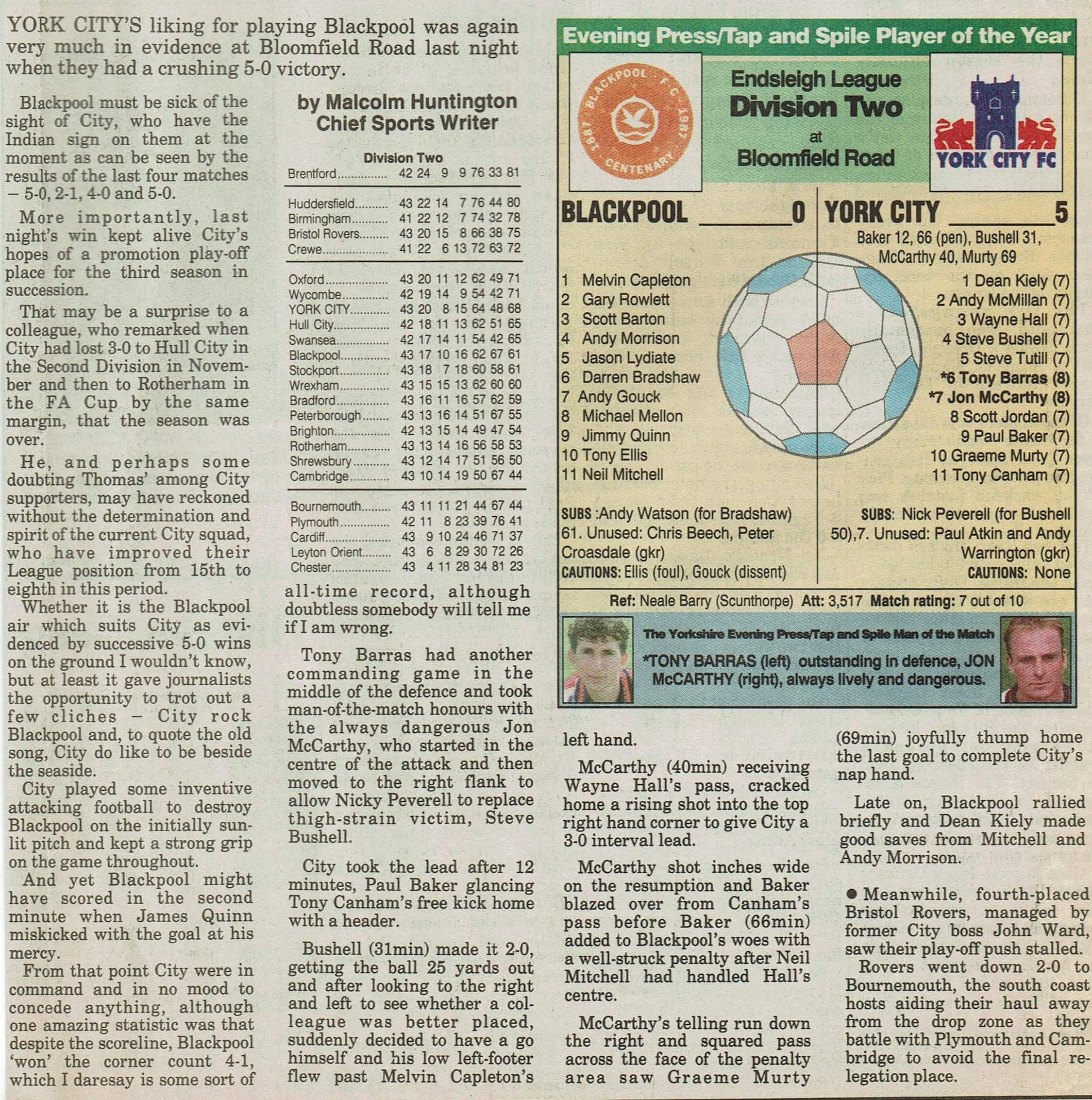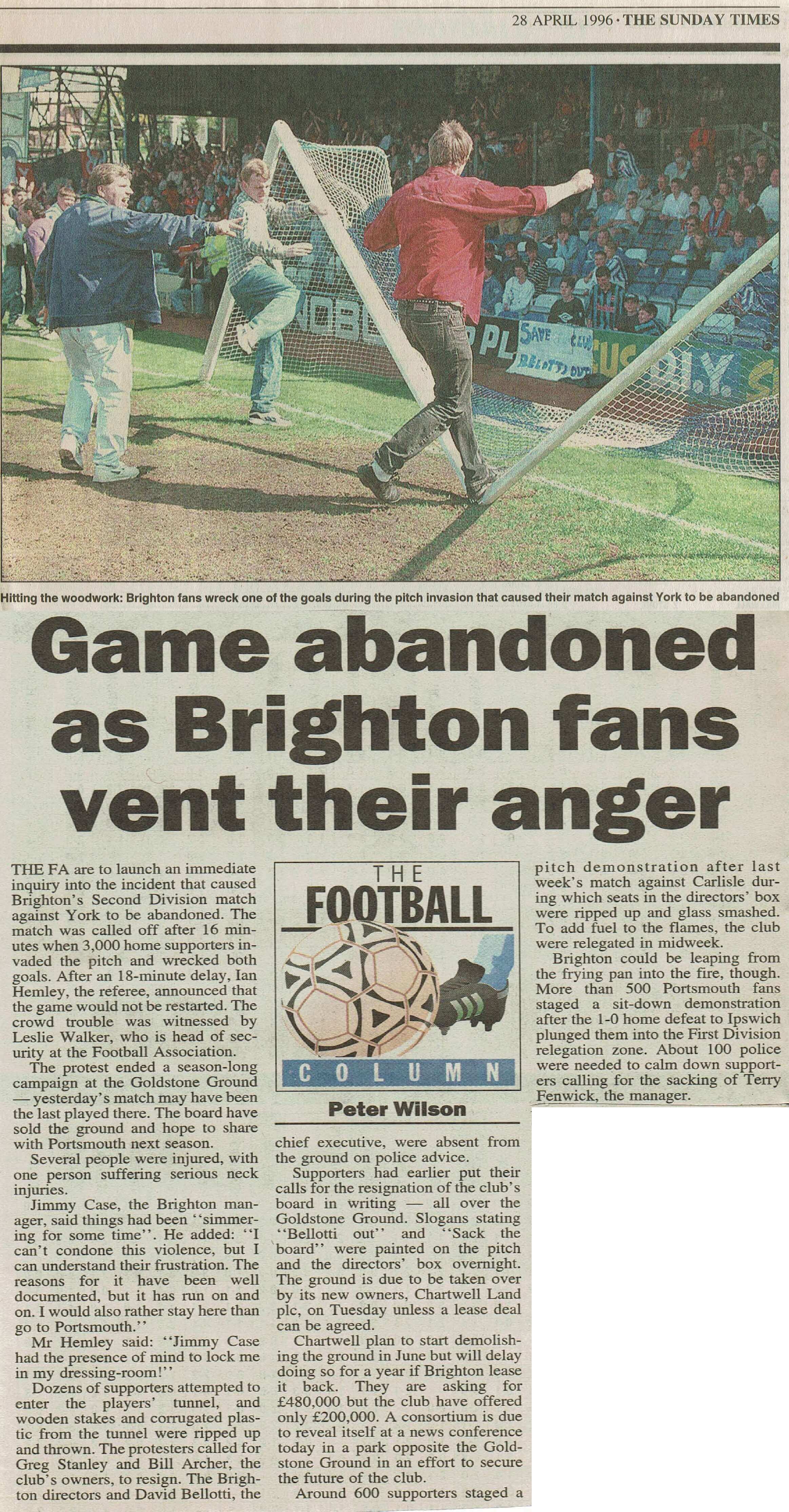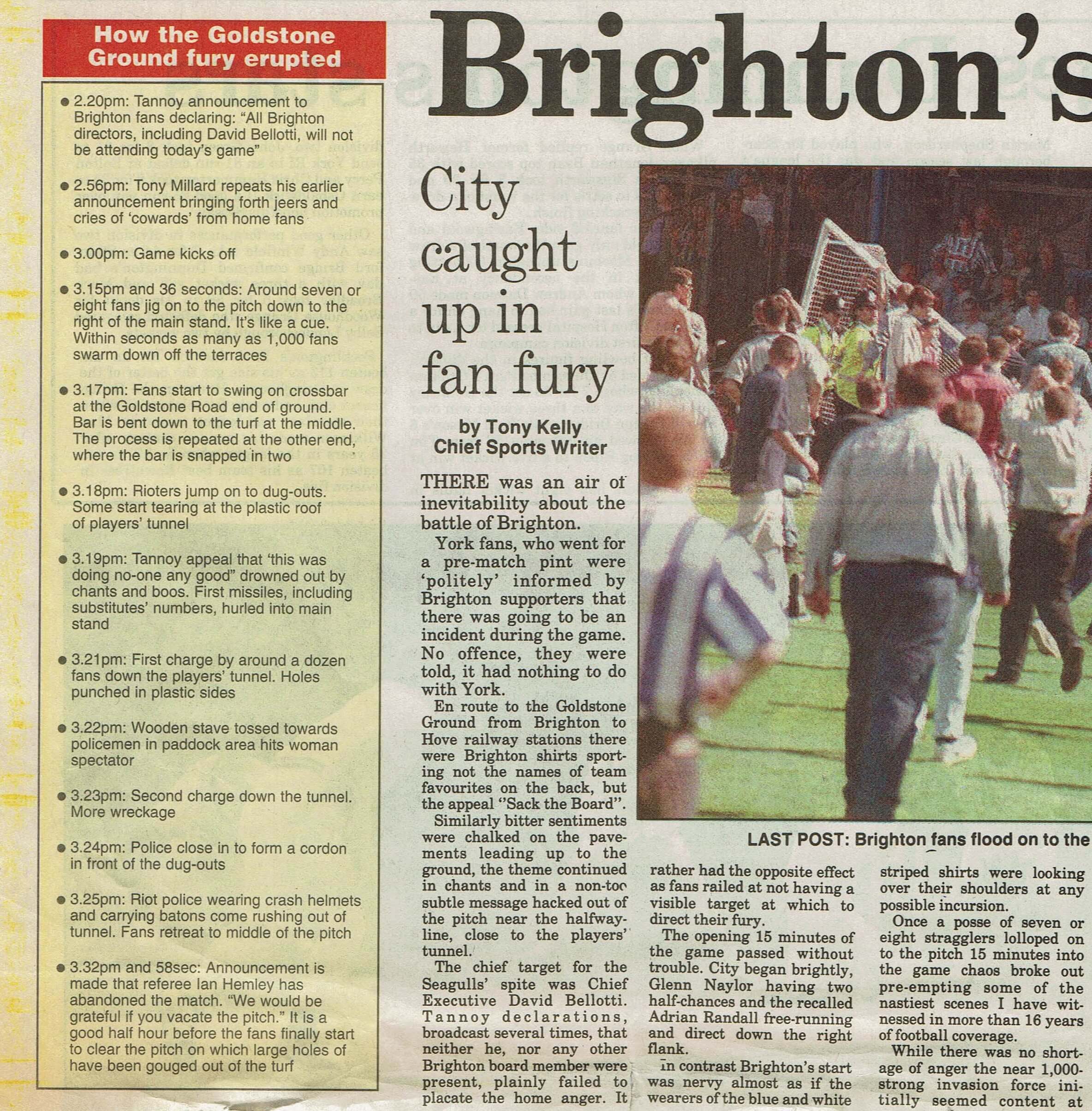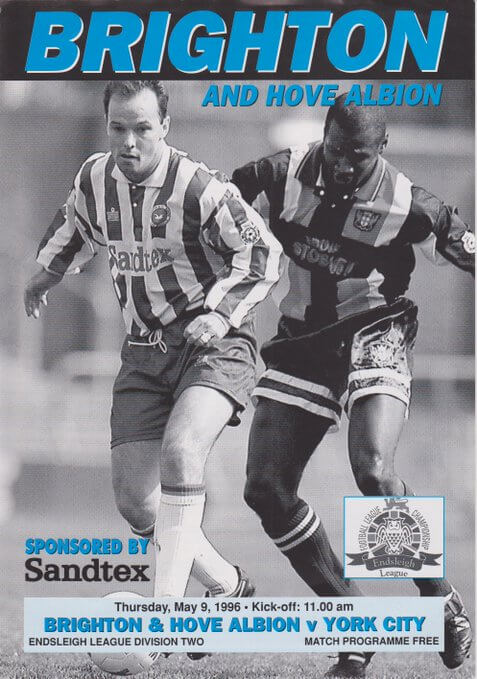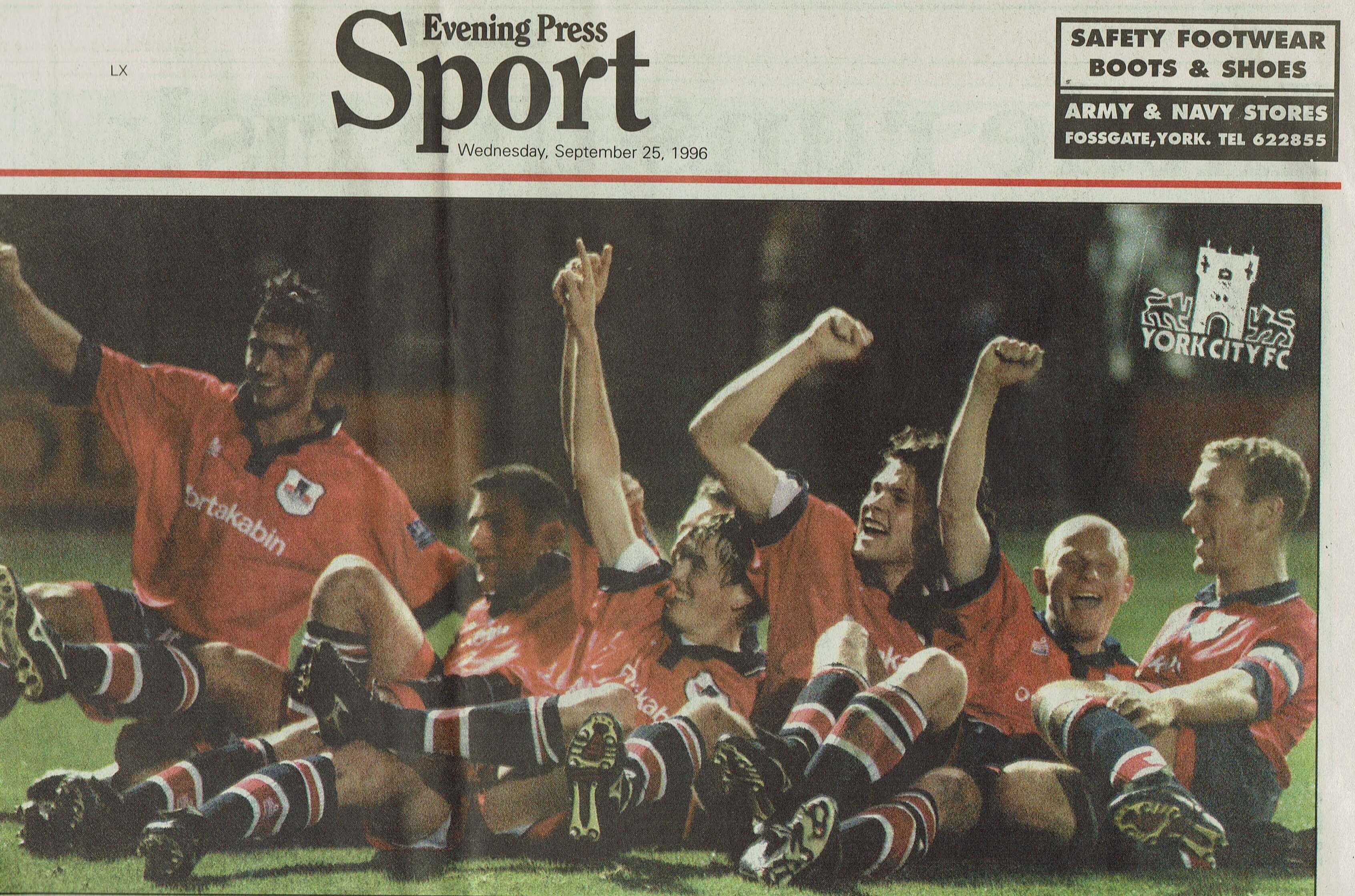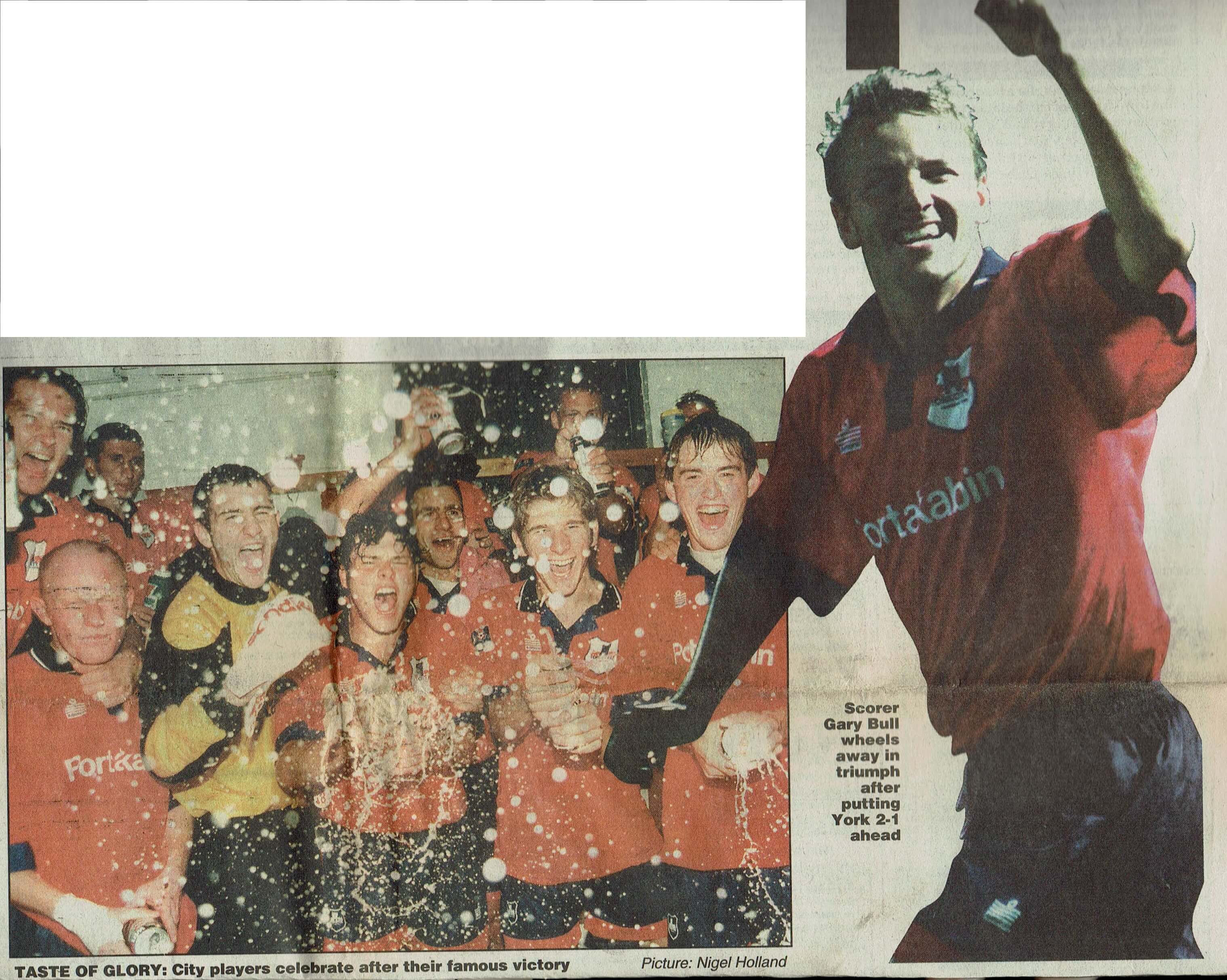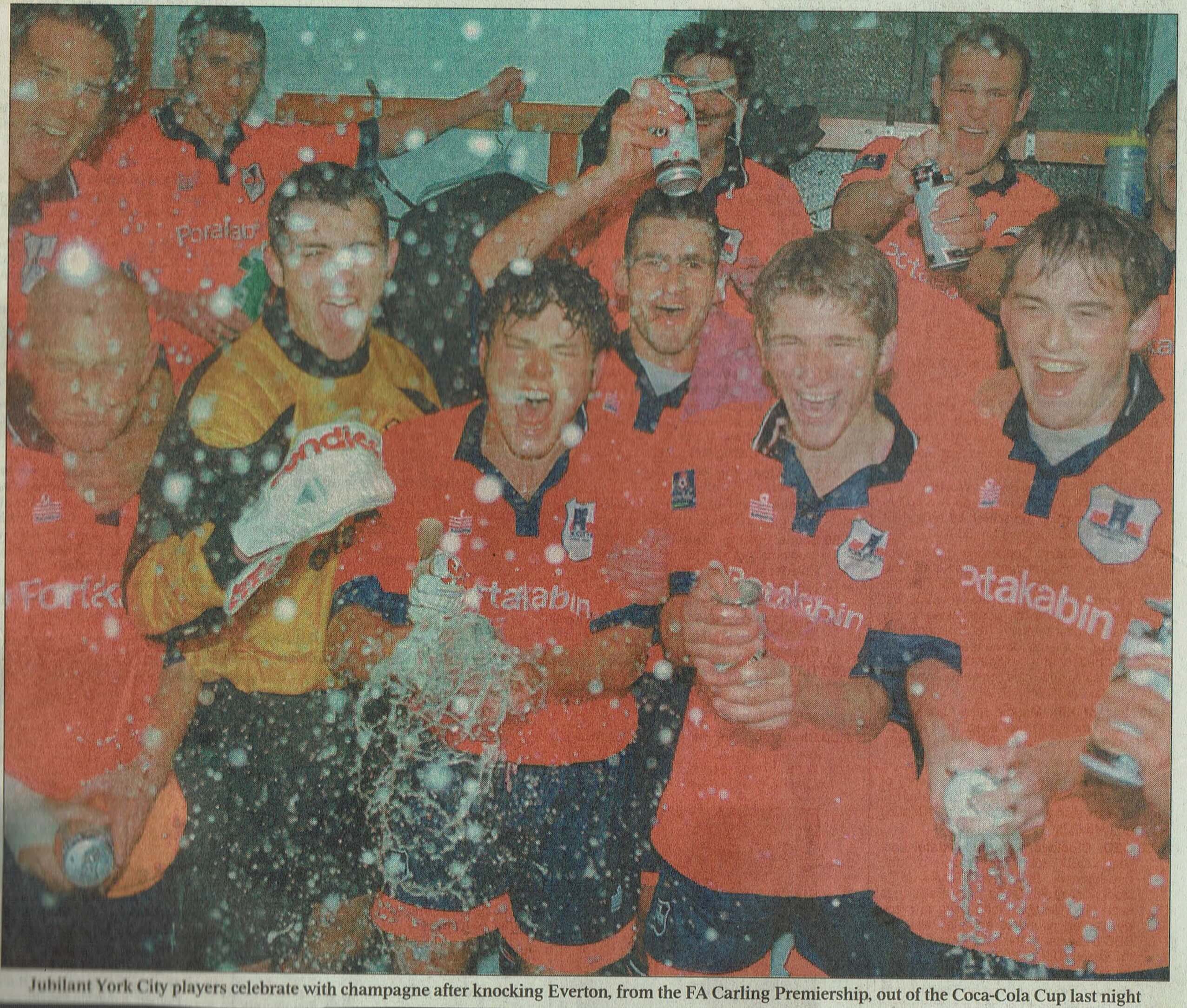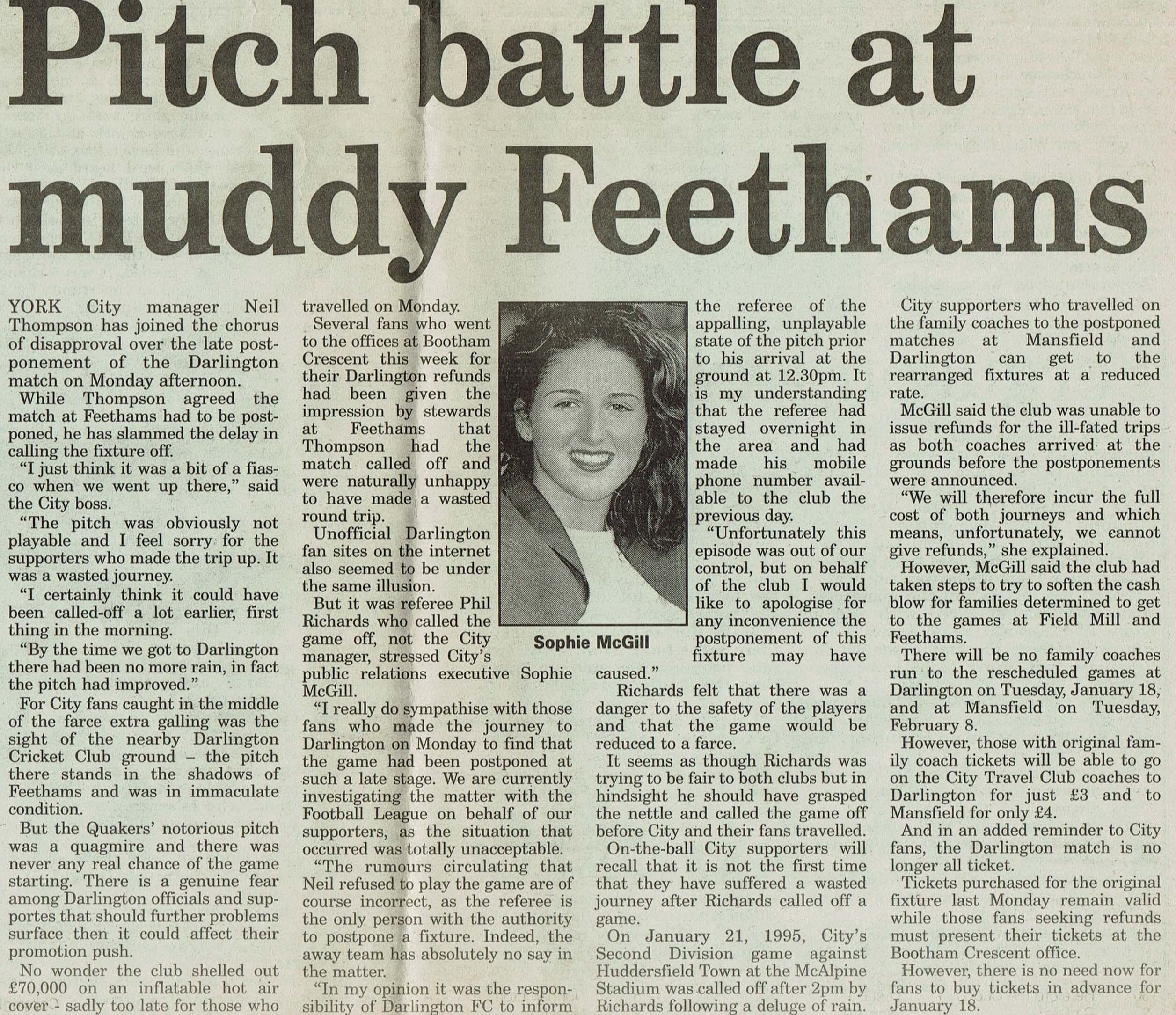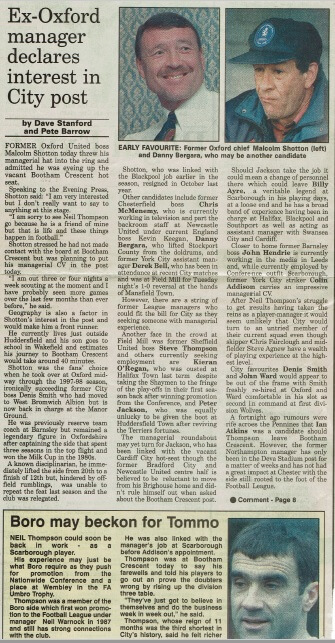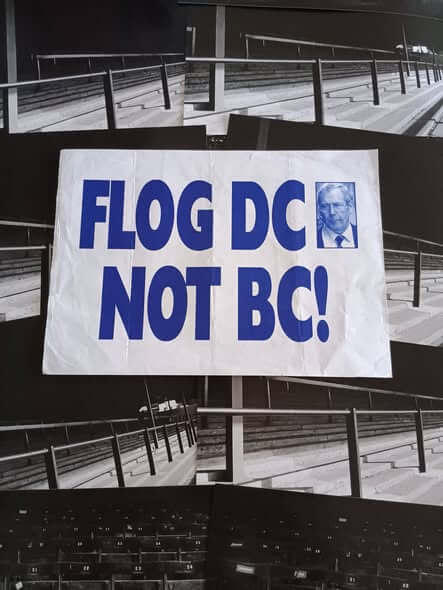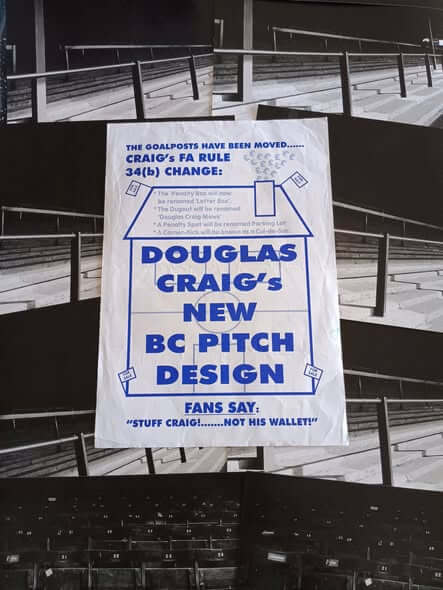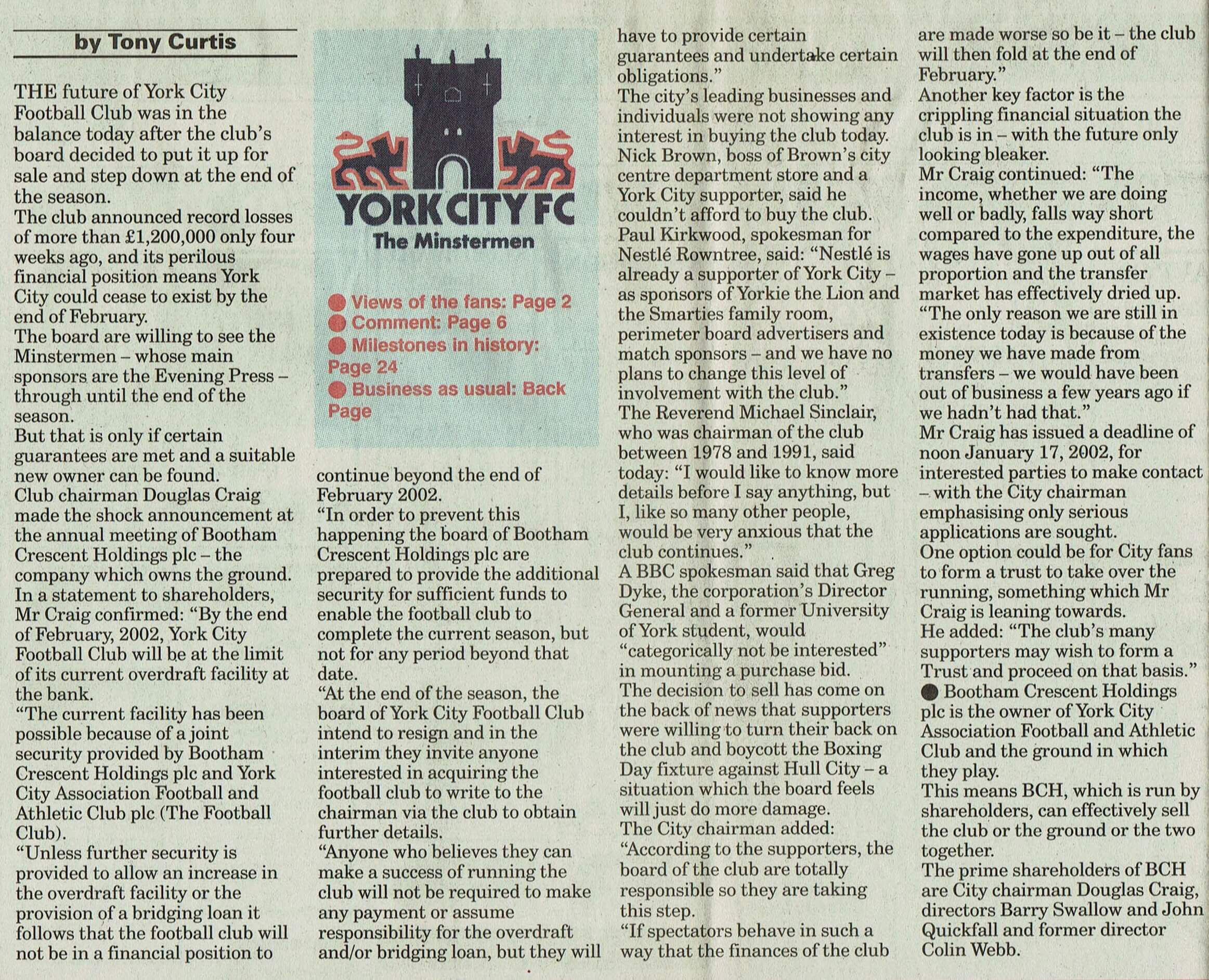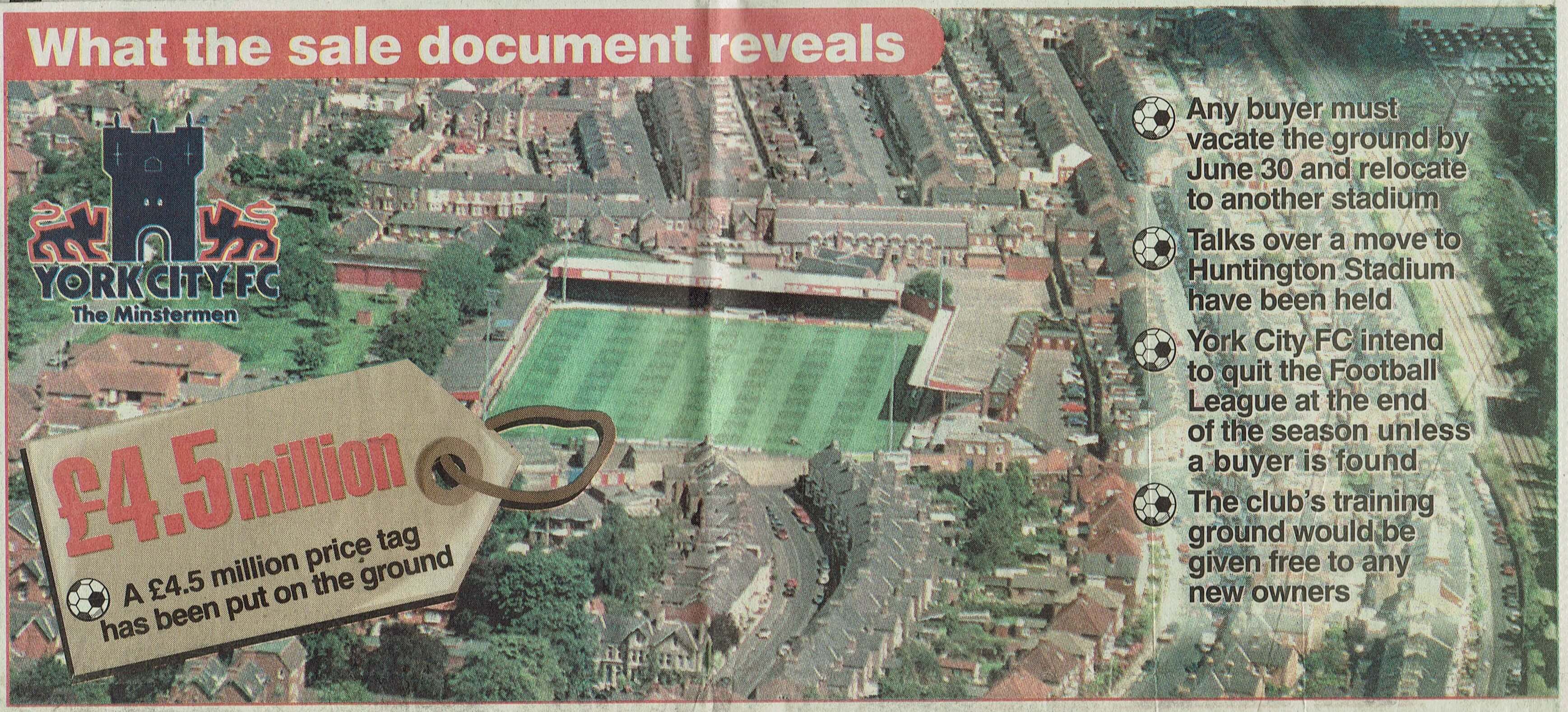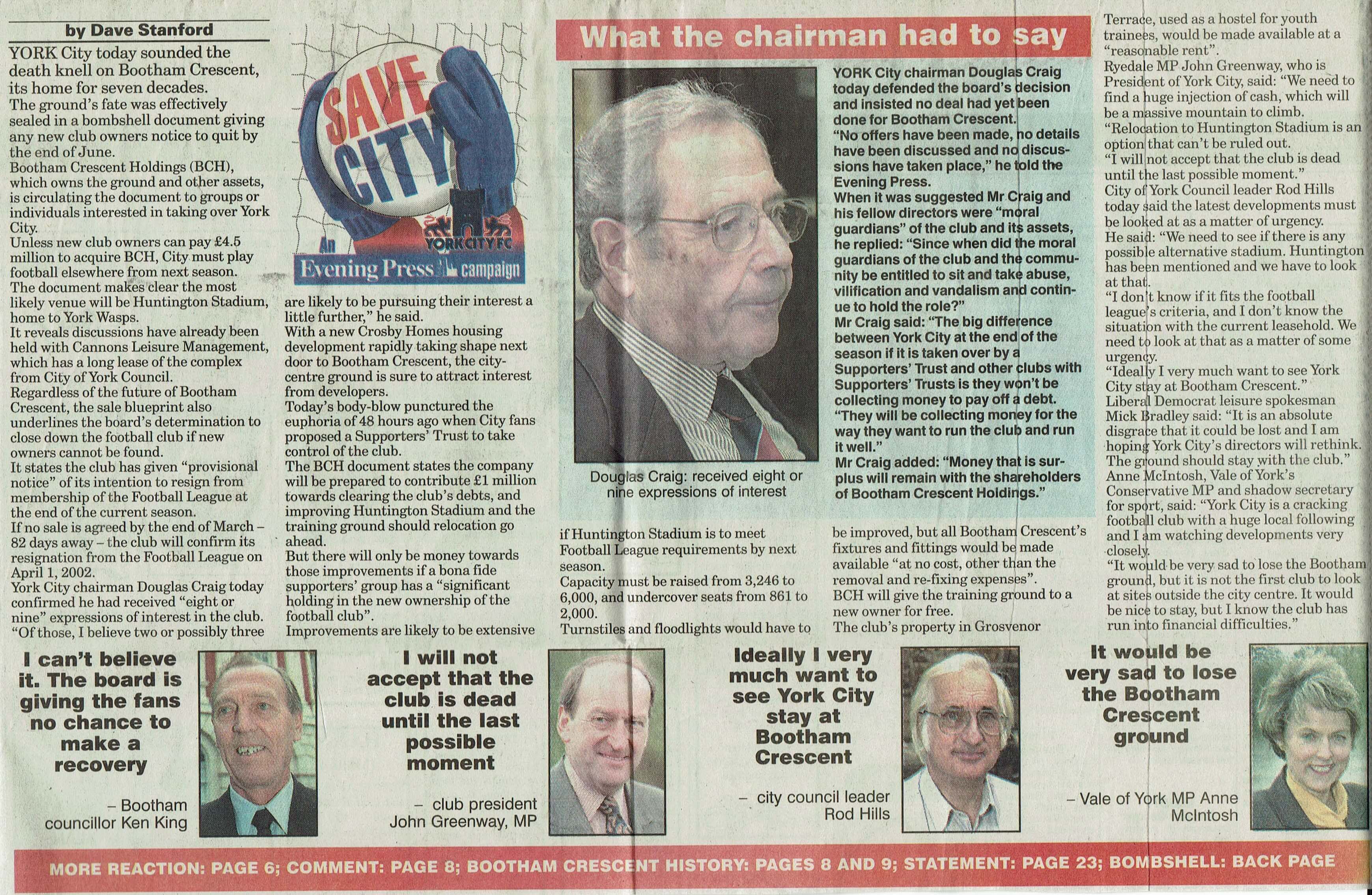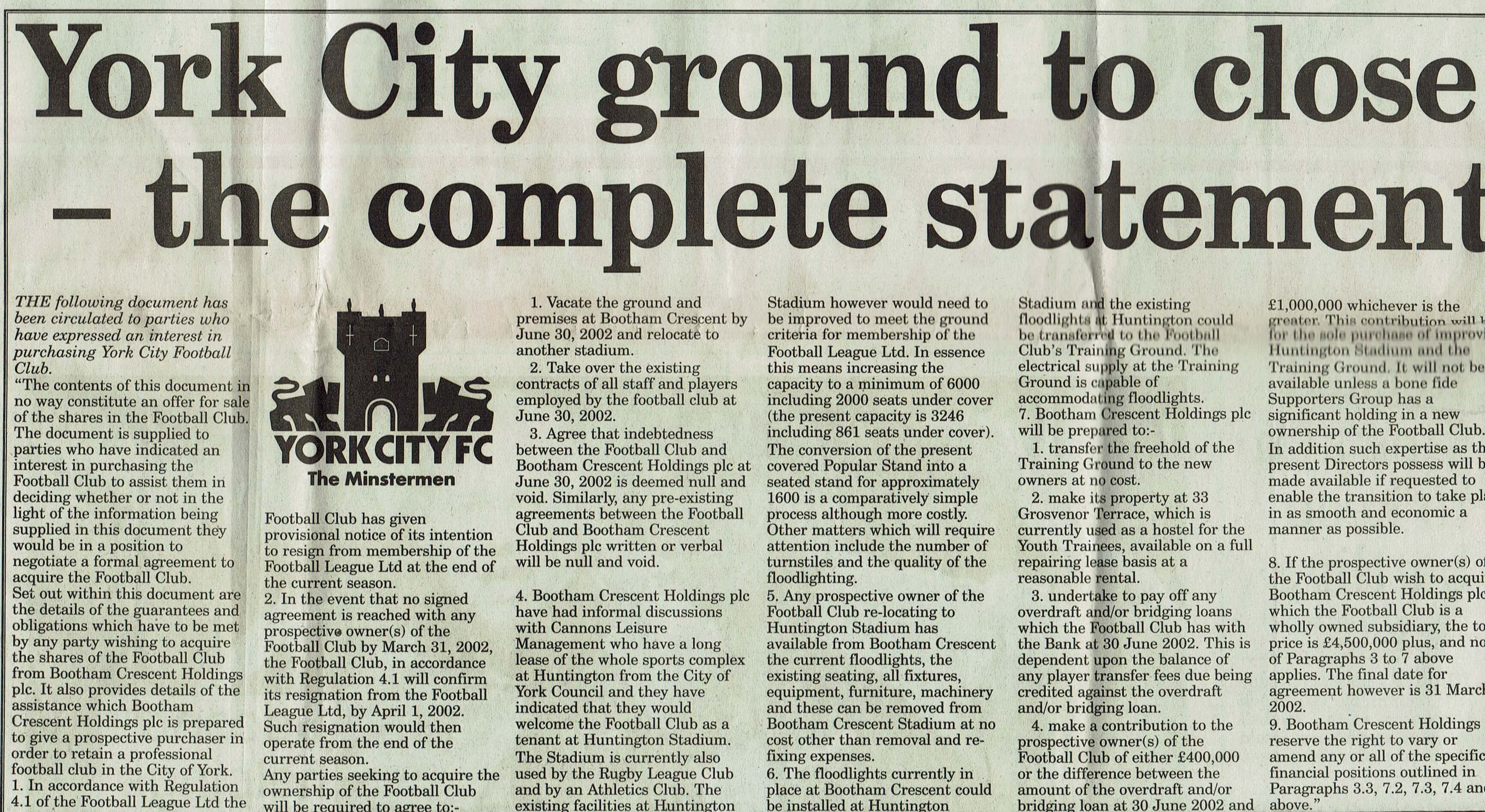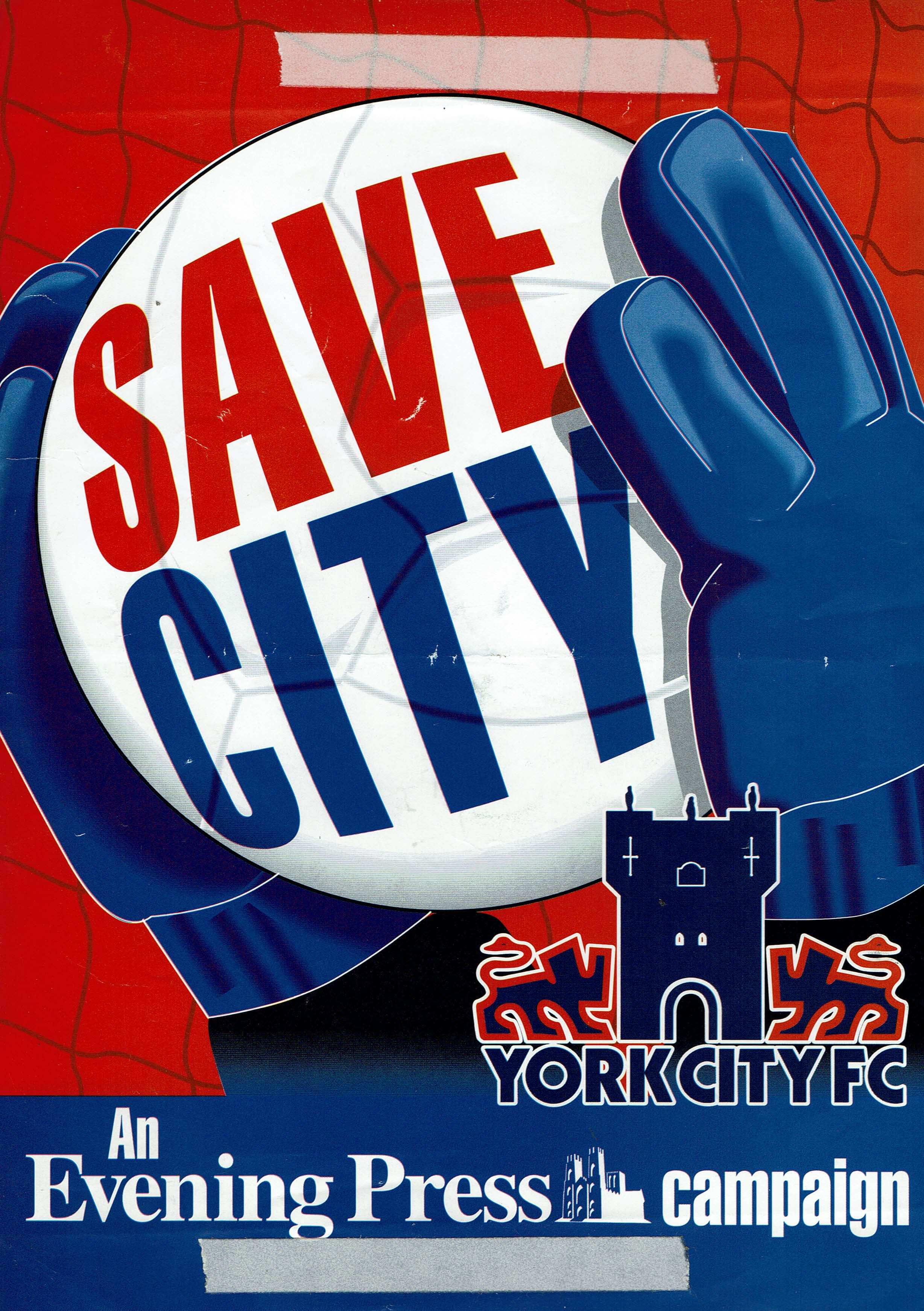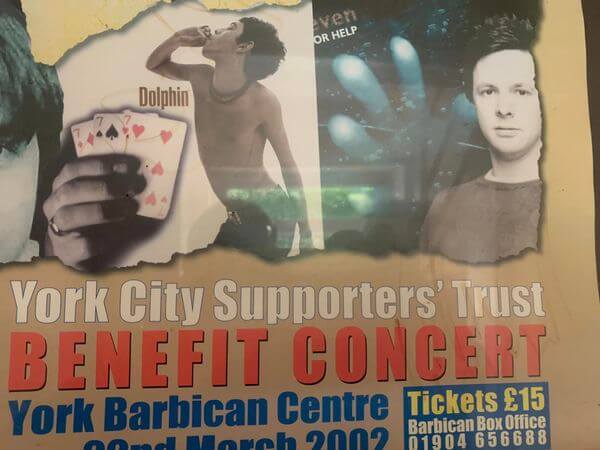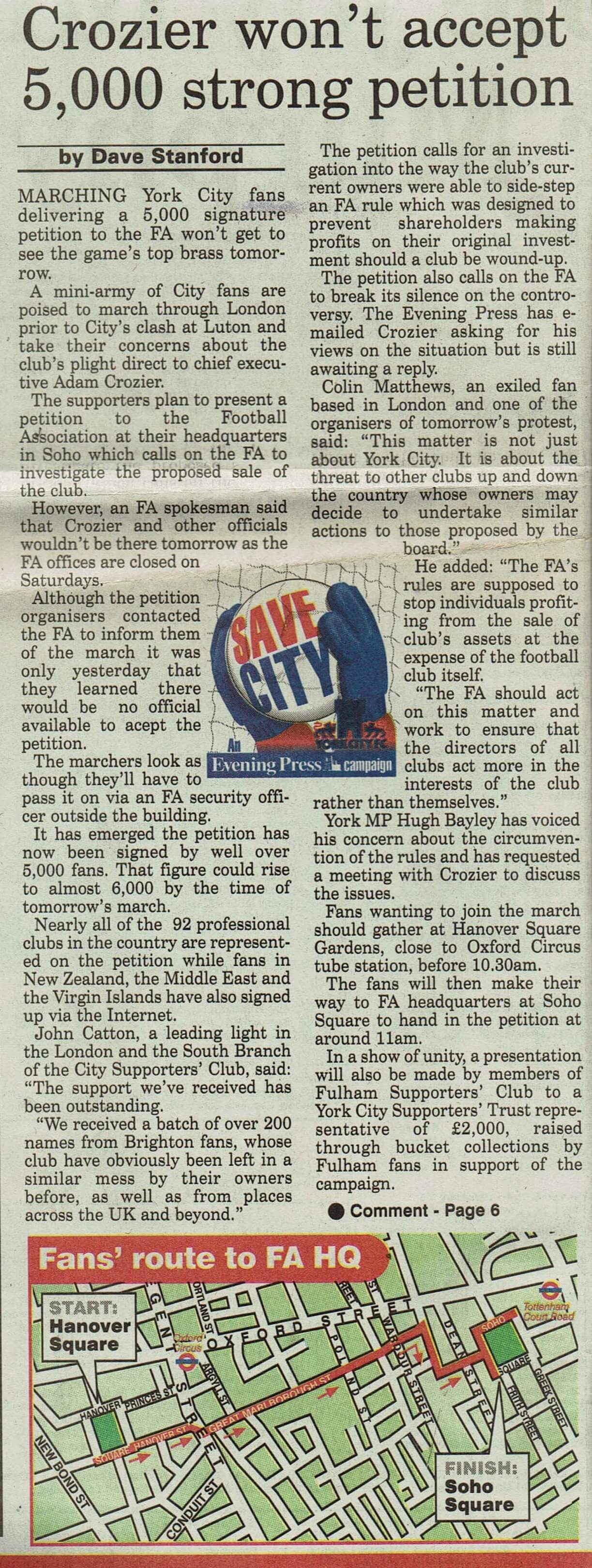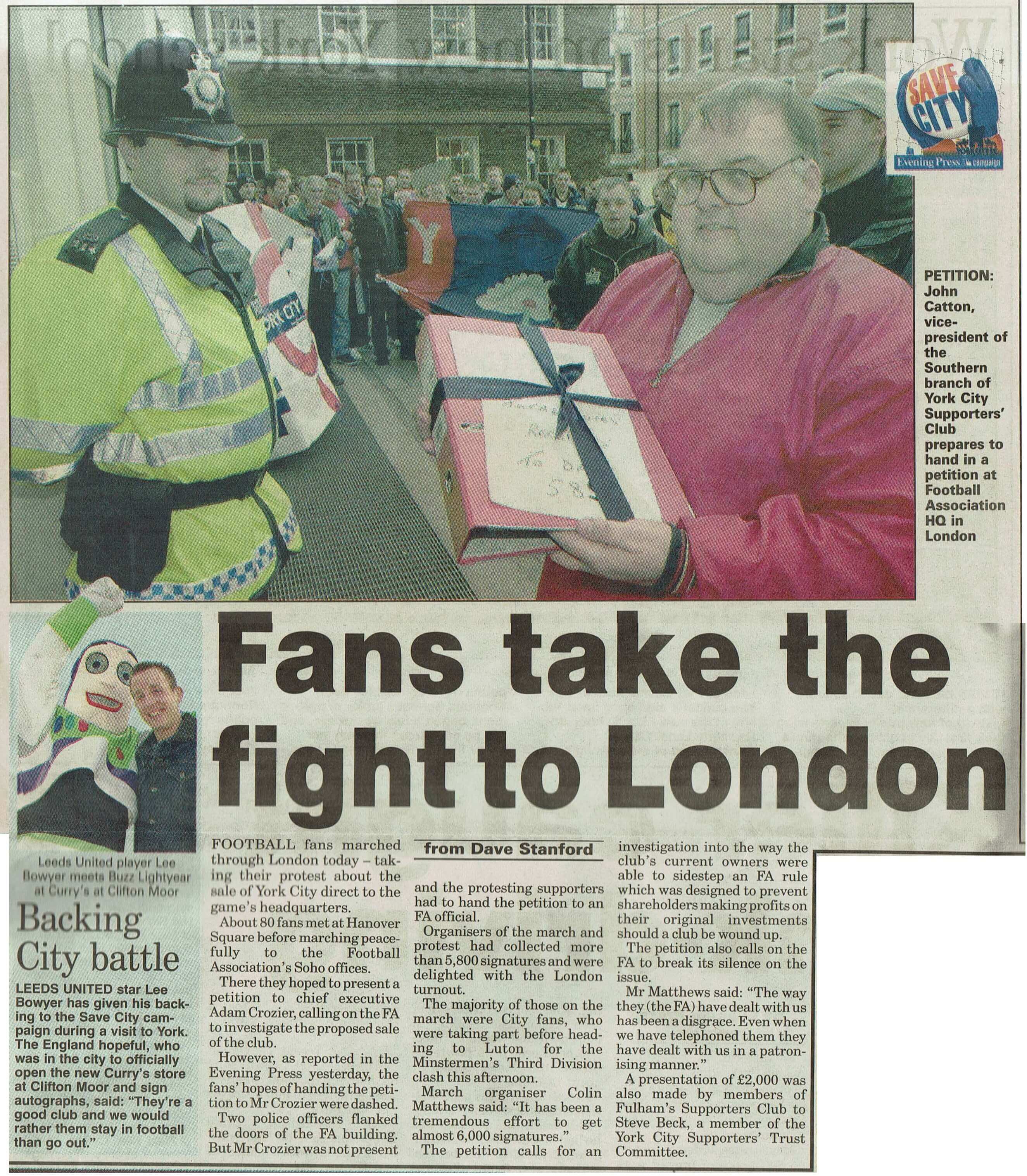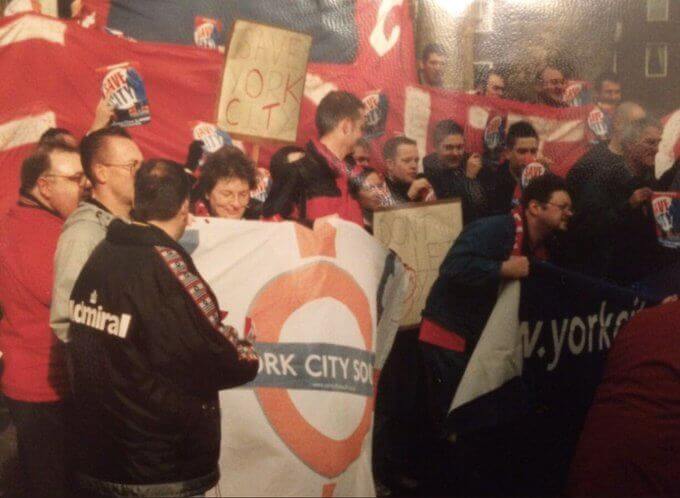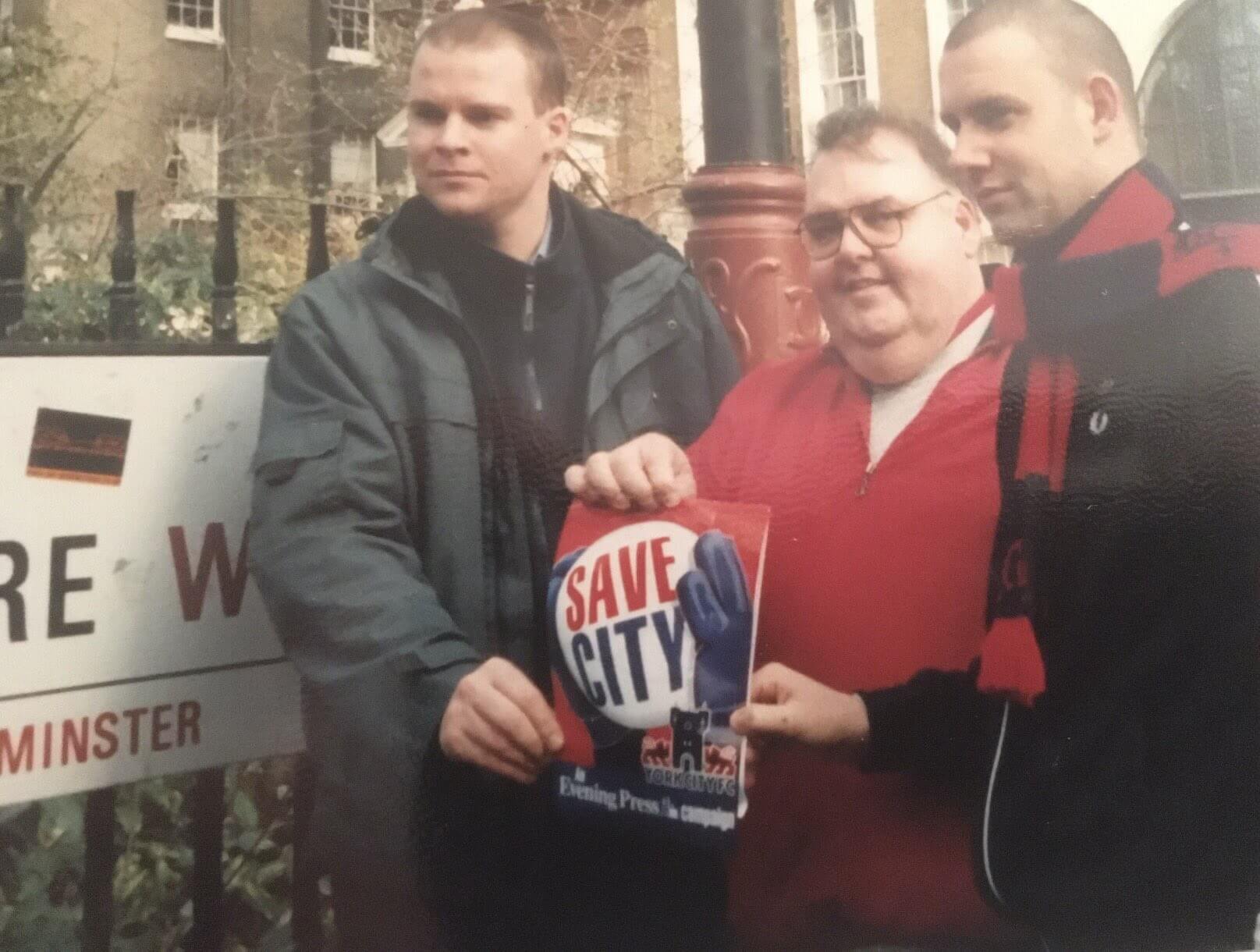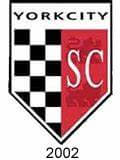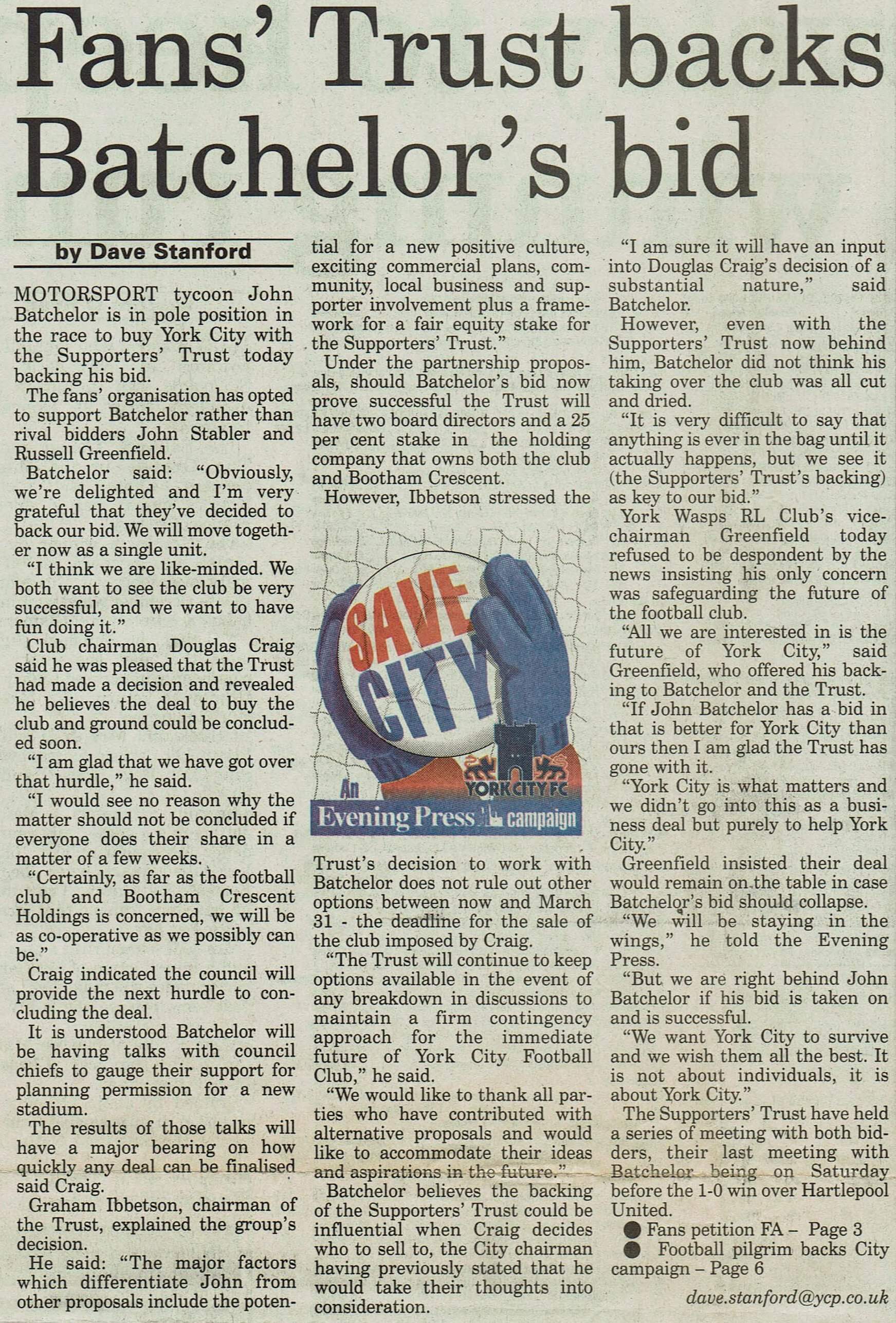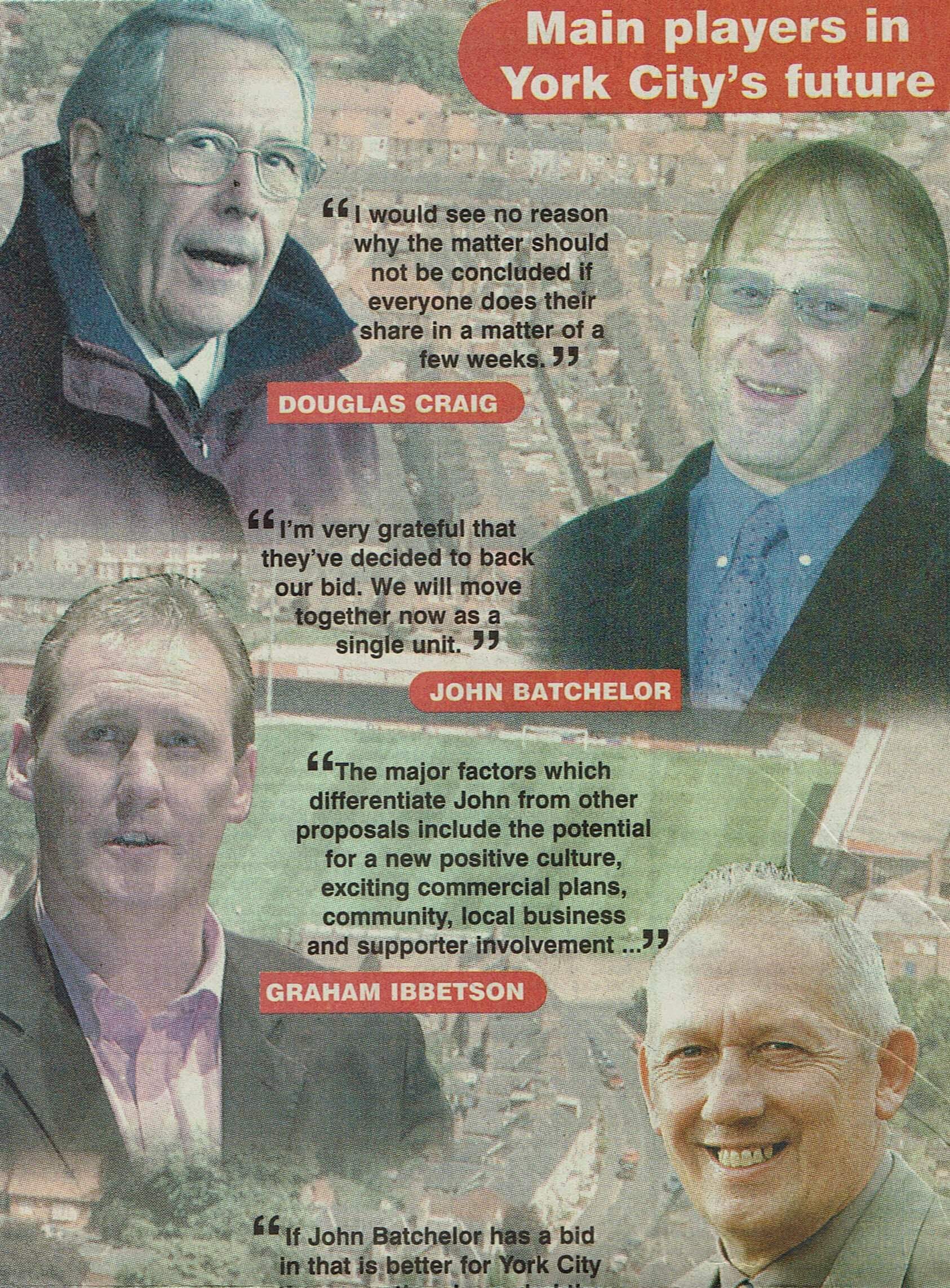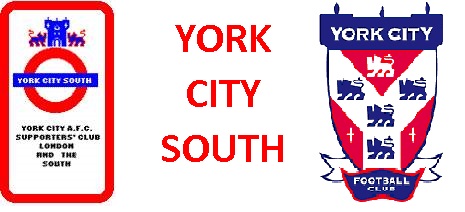

York City - 1991- 2004 - Alan Little and big money
In November 1991, John Ward was a left field choice to replace John Bird as City's manager, his first managerial appointment. He had a solid reputation as a coach having worked closely with Graham Taylor at Watford as they went through the divisions and later at Aston Villa under Taylor and Ron Atkinson.
Immediately, he brought positivity to the club, but couldn’t turn around playing fortunes with another 21st place finish. City’s defensive record was comparable with those of many teams in the division, but a lack of goals let City down.
John Ward’s pursuit of Paul Barnes finally came to fruition when City paid £50,000 for him in July 1992. Aged 24, he had relatively few Football League games behind him, but had been a prolific scorer for Stoke’s reserve team.
Goals from Barnes (and wins for City) in each of the opening 3 games of the 1992/3 season boded well. Despite leading the division for spells in early season, it wasn't to be all plain sailing as the months of December, January and February yielded just 2 league wins, the second being a 5-1 win over Scunthorpe on a snowy day at the end of February.
What impressed was City's style, with Barnes, Tony Canham and Jon McCarthy in full flight, the team was a joy to watch.
The shock departure of John Ward to Bristol Rovers in March didn't rock City. After serving as assistant manager under Ward and Bird, Alan Little was promoted to manager. With a 5-1 away win against promotion rivals Barnet on his managerial debut and then 5 wins in the last 7 league games, City eventually finished 4th, the top play off place. Bury were overcome in a tight play off semi final booking City’s first ever trip to
Wembley.
As Y-Front Fanzine wrote, "Whilst Crewe were walking around the manicured pitch in their tracksuits the City entourage looked resplendent in their suits with a white rose in the button hole. From that moment I know we would win because we had made the effort for the big occasion and they hadn't".
Despite dominating Crewe, it was 0-0 after 90 minutes, Jon McCarthy being to the fore with many long and mazy runs during the game. A Gary Swann goal gave City an extra time lead only for an inextricable handball by Steve Tutill (it wasn't the first penalty he'd conceded at Wembley, having conceded one for England Schoolboys against West Germany) to gift Crewe a last minute penalty and equaliser. The game went to penalties. Gareth Whalley’s was saved by Dean Kiely, with City's first four all being converted, Wayne Hall stepped up to score the winner. For all the flair and panache of the forwards, it was midfield scheming of Nigel Pepper and Gary Swann that saw City succeed. Their ability to win the ball, hold the ball, control the game and pick a pass was the key to the success of the forwards.
A season higher (1993/4), City’s pushed on for back to back promotions. Again it resulted in the play offs, this time, a semi final defeat to Stockport. That season, 106,570 supporters passed through the turnstiles for the 23 home league games, the last time a six figure season crowd was attracted. Later, a regular YCS guest speaker (and star of that side) indicated that the chairman and the club felt that City wouldn't have been able to survive financially if promotion had been achieved, presumabaly a much higher wage bill wouldn't be offset by increased attendances and more central funding.
By now City had a settled team. Scouts were flocking to Bootham Crescent. There were rumours of bids and interest for many players, Kiely, McMillan, Hall, Tutill, Bushell, McCarthy and Barnes included. City held firm but couldn't push on, finishing 9th, 6 points outside the play off places in 1995.
1995/6 was to prove to be a memorable season for City. It started off with Jon McCarthy leaving for Port Vale in pre season, a club record bid of £450,000 saw him step up a division (Ed - On
Hospital Ball, McCarthy said he signed his first pro contract for £180 per week and doubled it when he signed his next (probably in 1993) and he didn't sign a further City contract. By 1995, when he left, City's top earner was proabably on about £800 per week). The only points from the first 7 league games were gained from 2 draws.
The first win of the season followed, even so, a trip to Old Trafford for the first leg of a Coca Cola Cup tie was made with some trepidation. The home side, containing a number of current internationals and future stars (alongside a couple of debutants), capitulated to City. Goals from Paul Barnes (2) and Tony Barras gave City a
well deserved 3-0 win over United, Dean Kiely hardly being troubled all night. Despite Manchester United recalling all their stars, City progressed to the next round and a trip to QPR. City couldn’t overcome another top flight side, losing 3-1, a night memorable for both home and away supporters for the vocal support City received, some home fans suggesting the noise had never been so loud inside Loftus Road.
3 days later, City lost 6-1 at Peterborough. Afterwards Douglas Craig laid into the players on the team coach as it waited to leave the ground, Paul Barnes defending the players. The team was starting to break up.
Paul Barnes joined Birmingham in March 1996, City’s seasons struggled on, the game at Brighton in late April was abandoned when home fans invaded the pitch to demonstrate against their board. Before that game, some City fans were warned by Brighton supporters in the pubs beforehand that we would not get to see a full game whilst before kick off, Douglas Craig came over towards the City fans to say there were signs of trouble and asking that City fans stay in the stand if things when out of control. City fans remained in position when Brigthon fans invaded the pitch when the goalposts were torn down and mayhem ensued. Therew as no animosity towards City fans, just towards Brighton's owners.
City lost their last 2 scheduled last games of the season during the next week to drop into a relegation spot. The Brighton game was re-arranged for the following Thursday with an 11:00 kick off.
Despite the early start, and limited ticket availability, about 600 City fans made the trip, knowing City needed a win or high scoring draw to climb out of the relegation places. City won 3-1 to clamber to safety.
That season, the side was noticeable for a number of home grown youngsters starting to emerge Graeme Murty, Scott Jordan, Steve Bushell and Darren Williams being regular first team players. Equally, with a couple of big money outgoings, City twice paid record transfer fees. Rob Matthews signed for £90,000 and then Adrian Randall arrived on Boxing Day 1995 for £140,000 which remains to this day the biggest fee ever paid by City a player. Matthews departed within 4 months and Randall within his first year, neither showing their true worth in their short City careers (or indeed in their later careers).
1996/7 followed a very similar course to the previous season. Dean Kiely left pre season, at the end of his contract, City couldn’t agree a new deal with him and he left for another paltry tribunal decided fee. The Coca Cola Cup saw a two legged win over Everton (Graeme Murty was virtually unplayable in the second leg as he cemented his place in the team) before losing to Leicester in the next round. In the league, City struggled and for a second successive season, finished 21st, one place above the relegation spots.
During the 1996/7 season, City played 3 of the 2021/2 Premier League teams. The home league average attendance was 3,359 (5,307 away) with the highest being Burnley at 5,958. In the League Cup, games drew crowds of 7,854 (Everton) and 8,406 (Leicester), in both games the home areas were sold out, a capacity crowd being denied by a lqw take up from away fans.
1997/8 saw a slight improvement in league fortunes and the emergence of 2 more talented youngsters, Jon Greening and Richard Cresswell. Greening moved onto Manchester United in March 1998 for an initial fee of £350,000, eventually rising to about £1.1m with subsequent clauses (the most City have ever received for a player) Whilst another, Graeme Murty moved onto Reading for a new club record fee of £700,000 in the summer of 1998. 1998/9 saw Richard Cresswell really blossom. Having spent over 2 years around the first team, including a spell on loan at Mansfield, the boy returned for the new season as a man, much stronger in physique. It was to serve him well as he netted 19 goals and earned an England Under 21 cap as the March transfer deadline approached. Sheffield Wednesday won the scramble for his services, paying City a new club record fee of £900,000. Despite his goals, City had struggled in the league. 10 days earlier, Alan Little’s reign had come to an end, sacked after 6 years in charge. Only the 3 Toms (Mitchell, Lockie and Johnston) have enjoyed longer reigns as City manager. The change of manager didn’t have the immediate effect, but with a week to go, City’s status seemed assured.
As the decade came to its end, the parsimony of earlier years gave way to a loosening of the purse strings, as we broke our transfer record and also looked to recruit players on higher wages. The rest is history, as costs spiralled out of control resulting in the great demise of 2004.
Come the last week of the 1998/9 season, City had to lose twice and both Wycombe and Oldham needed to win 2 games to see City relegated. City were relegated, going down 4-0 at Manchester City on the final day of the season (after beating them 2-1 at Bootham Crescent in December, 25 years to the day later, the Blues were in Jeddah playinmg in the
Club World Club semi final).
Cresswell's departure was the last of the big money sales of City’s youngsters. No doubt, the youth set up missed Ricky Sbragia (after his 1994 departure to Sunderland) under whose tutelage many of the youngsters who earned big money transfers had started their City careers. Equally the 1995 Bosman ruling had a profound impact on the transfer market.
Under the chairmanship of Michael Sinclair in the1980s, the club has regretted not investing more after our 1984 Championship as we narrowly failed to gain back to back promotions.
By 1993, Douglas Craig, a board member under Sinclair, was chairman, and during his years in office, City spent big, at least big by City standards, both in transfer fees and wages as we strove to reach the second tier. Some would say expenditure that eventually proved to be our downfall. Once again, maybe our financial situation meant that once cheap players who found success at City grow old or moved on, we were unable to afford to buy adequate replacements in a higher echelon.
Back in the basement tier, City languished in the bottom half of the division for each of the next 3 seasons. Thompson lasted less than one year before being replaced by Terry Dolan. Under Dolan’s reign City were dour. A number of near 6 figure signings failed to make much difference. However, City improved to mid table in 2002 and 2003.
However, off the pitch City were rocked when Douglas Craig threatened to shut down the club. An acrimonious period. At the AGM in December 2001, Douglas Craig announced the club was for sale and that he’d be locking the doors of Bootham Crescent at the end of the season, without a buyer, City would be homeless. He valued the ground at £4m.
Quickly City fans mobilised and the York City Supporters Trust was formed. The Yorkshire Evening Press gave its full support to a Save City campaign. A big meeting was held at The Barbican and a 5,000 signature petition was raised. A fund raising campaig was launched. The wider footballing world throw its support behind the fans.
Richard Snowball (TOOAB 7th September 2021) remembered, back in 2003, as Trust chairman, he attended a meeting with Douglas Craig and asked him why he was closing the club down and he simply answered, "it is payback time for all the abuse the fans have given me".
Step forward John Batchelor. He from the soup family with a motor racing background. Read More.
Craig sold Batchelor the club and ground and was perceived as a hero in many quarters.
Quickly, his vison was questioned as the club was renamed York City Soccer Club in an attempt to appeal to the American market and links with his own motor racing team were established. Batchelor’ arrival saw an influx of 3 “world“ players (Rogerio Carvalo (Brazil), Nicolás (Jorge) Mazzina (Argentina) and James Okoli (Nigeria / Dutch)) in the summer of 2002. Between them, they made just 12 first team appearances and all had left the club before the end of season. Cash was tight. On York Hospital Ball, as a player, Lee Bullock recalled he did not have much personal contact with Batchelor but remembers being invited to Croft motor racing events where he received lavish hospitality in stark contrast to the situation at City. Half price season tickets for the 2003/4 season were available in October 2002. A few weeks later, the PFA had to foot City's November wage bill whilst that month's sale of Russ Howarth covered the wage bill for the next 2 months. A few months later, City entered a creditors’ voluntary agreement. A Supporters’ Trust was formed and on 26 March 2003 it took control of the club under the chairmanship of Steve Beck. City had been within hours of folding, total debts were believed to be nearly £2m.
Under the Supporters Trust, for the 2003/4 season, Terry Dolan was relieved of his duties and replaced by popular captain Chris Brass as player manager, he became the youngest manager in The Football League. The season started well, with a maximum 12 points from the first 4 games. In 10th place in January, City didn’t win again the last 20 games of the season being relegated into The Conference with 2 games to play in 2004.
The era also saw the introduction of the Junior Reds, which quickly topped over 1,000 members, and the advent of the both Yorkie and later Shippo the lion, the brainchild of Commercial Manager Sheila Smith in the mid 1990s. Steve Ovenden, the original Shippo recalls, "Shippo was the first lion and Sarah Pullon did a great job bringing smiles to many faces. It was a cumbersome suit and movement was not easy. The Club decided on a change and so Shippo jetted off into retirement following a 4-0 loss at Maine Road in May 1999 following relegation. Yorkie was born and sponsored by Nestle. Yorkie's home debut was in August 1999. Smaller and more compact it allows for more movement and interaction with fans. Original Yorkie left the club for a period of time about 2010 ish following disagreements with owner.
Lessons were not learned and the new Yorkie was once again created in a huge and cumbersome size meaning difficulty for movement but the volunteers again do great stuff to bring it to life and have fun interactions with fans. Original Yorkie returned when The Uggla Family took ownership of the club and first game back was Sheff Wed's PSF.
Original Yorkie is somewhat retro with original shirt from 99/2000 season as a nod to the past. Despite his age Original is the smaller one and easier to manoeuvre. It is therefore easier to get about the ground, join singing with the wonderful south standers and of course mock those opposing players who choose to waste time". I can personally vouch for the comments regarding Shippo, borne out of a York Sixth Form College art project. Its bulbous head made for tunnel vision, its furry body, even on a cold day, made it very sweaty for the wearer, whilst the head was liable to fall off with an sudden movement and the boots were flimsy.
Yorkie and Shippo - Naughty Boys.
